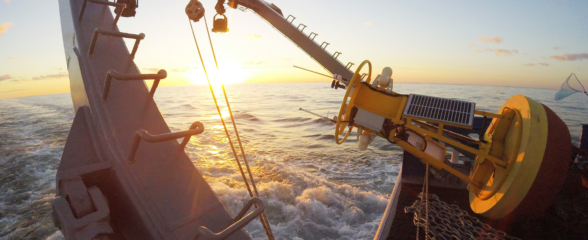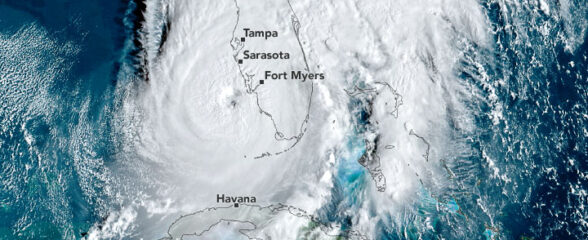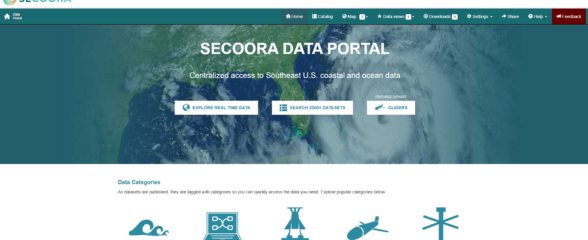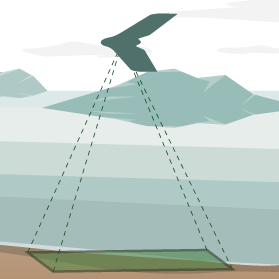Uncrewed Aircraft Systems (UAS or Drones) are rapidly growing components of research, assessment and monitoring of coastal regions within the US Southeast and Caribbean.
Southeast Coastal Ocean Observing Regional Association (SECOORA) is seeking applications to sponsor up to six candidates from the US Southeast and Caribbean region to attend three UAS executive education courses offered by the Nicholas School of the Environment at Duke University.
Each online course is six weeks in duration, and includes asynchronous video lectures, weekly 1.5 hour virtual synchronous sessions, projects and assessments, and inclusion into a growing online community of UAS researchers. After successful completion of all three courses, applicants will receive a certificate of completion and learners will be able to:
- Explain basic aeronautics, flight physics, and describe how and why drones fly.
- Describe the foundations of revolutionary drone technology and how it’s being applied in environmental science and management.
- Identify how drones can be applied in novel research or management applications, including their own.
- Describe the basics of drone flight operations, become legally certified to apply for the Part 107 license from the FAA, and fly effectively for scientific research and/or resource management.
- Identify the legal and ethical challenges of using drones in environmental science.
- Analyze drone data to test scientific hypotheses and communicate research results.
- Use modern analytical software to assess habitat changes, count animal populations, study animal health and behavior, and assess ecological relationships.
Submissions are due at 5:00 PM ET on June 30, 2021.
Click here for a PDF of the Request for Proposals.
About the Three Courses (flyer and website)
Course One: Introduction to UAS in Biology, Ecology, and Conservation
Discover the foundations of revolutionary drone technology and how it’s being applied in environmental science and management.
Start Date: October 4, 2021
Goal: Identify how drones can be applied in research and management, including your own.
Course Two: UAS operations for Environmental Scientists
Learn the basics of drone flight operations, how to become legally certified, and how to fly effectively for scientific research and management purposes.
Start Date: January 10, 2022
Goal: Become a scientist pilot!
Course Three: Quantitative analysis of UAS data
Gain hands-on experience with drone data and modern analytical software needed to assess habitat changes, count animal populations, study animal health and behavior, and assess ecosystem relationships.
Start Date: March 7, 2022
Goal: Use drone data to test scientific hypotheses and communicate results.
Request for Proposals
Proposals must follow the required format. Proposals that do not follow the required format will not be evaluated.
Maximum page length is three pages (not including appendices). Text should be 12-point font, all margins one-inch, and must include the following components:
- Title Page
- Proposal title
- Applicant’s name and complete contact information
- Statement of interest describing how the knowledge gained will be applied.
- Brief description of how the courses will advance the individual and their organization’s mission in the region.
- Please note: SECOORA is only supporting applicants that work at academic, nonprofit, or public institutions in North Carolina, South Carolina, Georgia, Florida, Puerto Rico and/ or US Virgin Islands.
- Statement of qualifications of applicant (i.e. summaries of past drone work or research, familiarity with GIS software such as ESRI, Google Earth, qGIS).
The following are proposal appendices that do NOT count towards the three-page limit:
- A curriculum vitae (CV) or resume.
- A signed letter of support and commitment from the applicant’s supervisor indicating how drones are used to accomplish the institution’s mission, and the role of the applicant in that work.
Eligibility
An eligible applicant is any state or local public sector employee from an institution in North Carolina, South Carolina, Georgia, Florida, Puerto Rico or US Virgin Islands. SECOORA cannot sponsor federal employees.
Submission
Please submit the entire application package electronically in PDF format through egrants.secoora.org. The submission deadline is 5:00 PM ET on June 30, 2021.
You must complete the registration process in order to upload a proposal to egrants.secoora.org. This is a two-part verification system (phone and email confirmations are required). Once you have registered, please select the Request for Proposal to which you are applying, complete the required fields, and upload your proposal as a complete PDF.
Evaluation Criteria
All proposals will be evaluated based on the following criteria:
- Statement of interest and need – 30%
- Anticipated outcomes of training to enhance individual, institutional and regional UAS capacity and commitment to capacity building – 30%
- Qualifications of applicant – 25%
- Compliance with proposal guidelines – 15%
Final decisions will include consideration of geographic distribution of awardees.
Diversity, Equity, and Inclusion
SECOORA is committed to building inclusive research, extension, communication, and education programs that serve people with unique backgrounds, circumstances, needs, perspectives, and ways of thinking. We encourage diverse applicants from all backgrounds to apply for this competitive opportunity.
Award Funding
The successful applicants will be notified no later than July 2021. Course fees will be paid directly to Nicholas School of the Environment at Duke University by SECOORA. If selected to receive this award, you are committing to completing the three courses.
This is an open and competitive process. SECOORA reserves the right to reject any and all applications/proposals received as a result of this process. SECOORA reserves the right to request that applicants make modifications to proposals at any time before an award is made.
Questions Regarding Solicitation
For any questions related to this solicitation, please contact Abbey Wakely (abbey@secooraorgpact.wpengine.com). Good-faith efforts will be made to answer as many questions as possible, but an answer is not guaranteed for every question.
Related news

Funding Cuts to NOAA IOOS Will Hurt the Southeast
Proposed federal funding cuts would eliminate the IOOS Regional Observations budget for next year. Contrary to the budget Congress has already approved for this year, the Executive Branch wants these proposed cuts to go into effect in 2025.

SECOORA Webinar on the Rapid Intensification of Hurricane Ian: Warm Subsurface Water on the Wide Continental Shelf
Join us Thursday, April 24th at 12 PM ET for the April installment of the SECOORA Coastal Observing in Your Community Webinar Series! This month, we will hear from Dr. Yonggang Liu from the University of South Florida. He will discuss his research on the rapid intensification of Hurricane Ian in relation to anomalously warm subsurface water on the wide...

Webinar: SECOORA Data Portal Demo
Join us on Thursday, February 20, 2025 at 1:00 PM ET to learn more about the SECOORA Data Portal and how to navigate it. Axiom Data Science will be providing an overview of the portal, including how to search the Catalog and make a custom data view.
